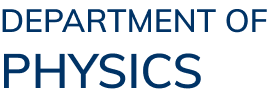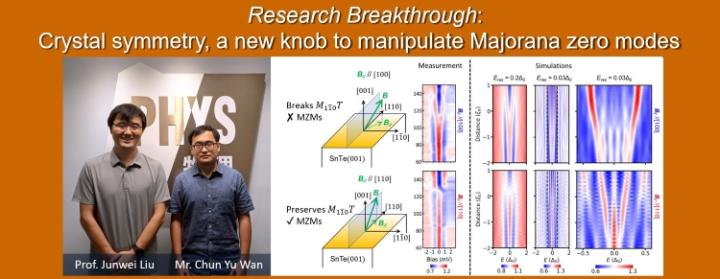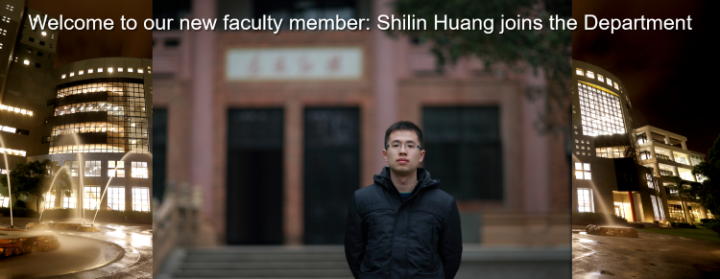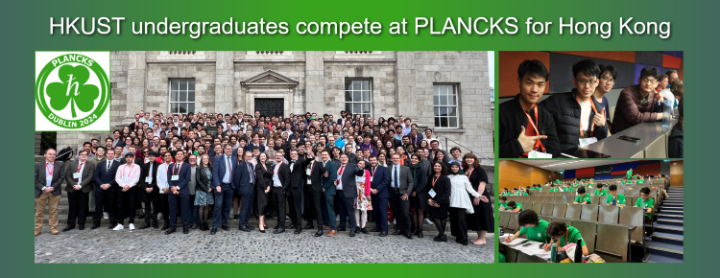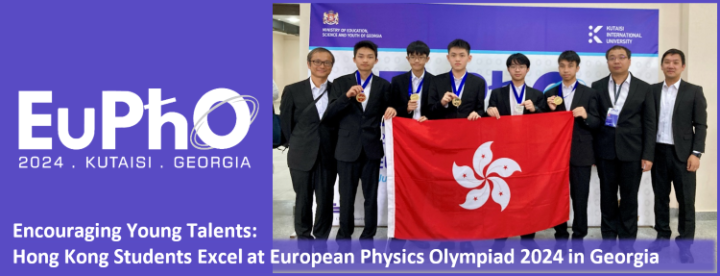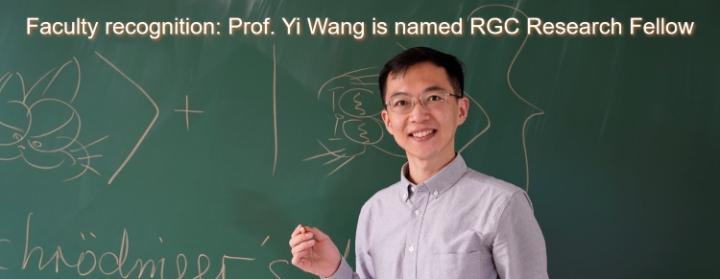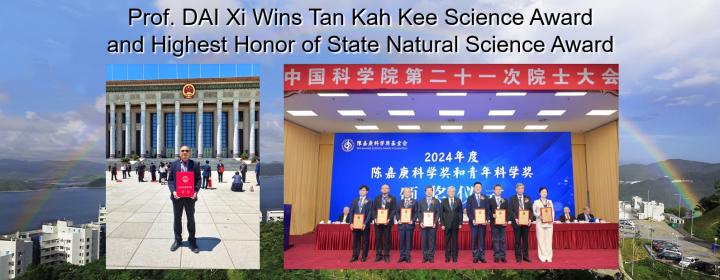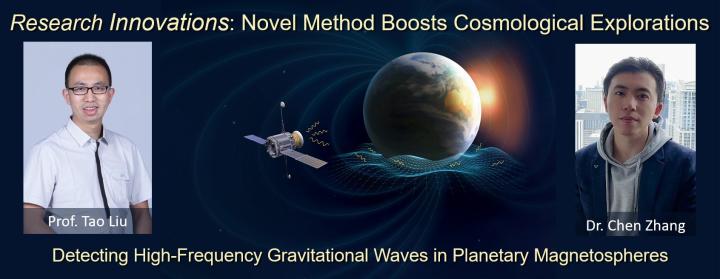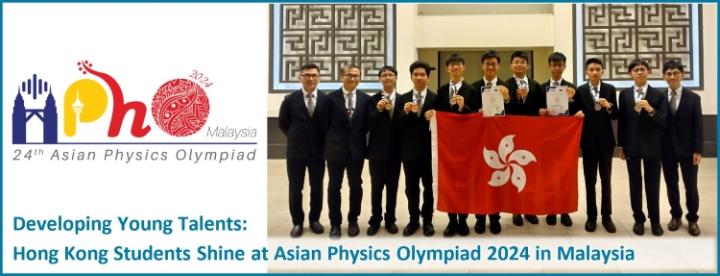News & Events
2024-10-18
Congratulations to Xuan Tan Nguyen, Cheuk Kan Kelvin Yue, and Jundong Zhu (l-r) for being awarded 2024 Academic Achievement Medals. The Academic Achievement Medal is the highest academic honor bestowed by the University on outstanding undergraduate students upon graduation. The awarding of the Medal was established in 1994 to recognize graduates whose outstanding academic achievements bring honor and distinction both to themselves and to the University. Only the top 1% of graduates are awarded the Academic Achievement Medal annually. These awards will be presented at the 32nd University Congregation on 24 November 2024. The Department is very proud of all graduates and additionally delighted in the achievements of the Academic Achievement Medal awardees.
Xuan Tan Nguyen is currently pursuing a Ph.D. with a focus on quantum information in the Department of Physics at Boston University. Cheuk Kam Kelvin Yue is pursuing his interest in high energy physics as an M. Phil. student in the Department of Physics at HKUST. Jundong Zhu is pursuing an M.Sc. degree in the Data-Driven Modeling program offered by the Departments of Physics and Mathematics at HKUST. Notably, Mr. Nguyen and Mr. Yue performed award-winning research during their undergraduate studies, as Winner and Honorable Mention recipient, respectively, of the Paul and May Chu Undergraduate Research Awards.
Read more
2024-09-19
A collaborative research team led by Prof. Junwei Liu, Associate Professor in the Department of Physics at the Hong Kong University of Science and Technology (HKUST), and Prof Jinfeng Jia and Prof Yaoyi Li from Shanghai Jiao Tong University (SJTU), has identified the world’s first multiple Majorana zero modes (MZMs) in a single vortex of the superconducting topological crystalline insulator SnTe and exploited crystal symmetry to control the coupling between the MZMs. This discovery, which is published in Nature, offers a new pathway to realizing fault-tolerant quantum computers.
A MZM is a zero-energy topologically nontrivial quasiparticle in a superconductor that obeys non-Abelian statistics, allowing for inequivalent braiding sequences, even though the total number of exchanges is the same (Fig. 1a). This contrasts with ordinary particles, such as electrons or photons, where different braiding always results in the same final state (Fig. 1b). This unique property protects MZMs from local perturbations, making them an ideal platform for robust fault-tolerant quantum computation. Although significant progress has been made in engineering artificial topological superconductors, the braiding and manipulation of MZMs remain extremely challenging due to their separation in real space, which complicates the necessary movements for hybridization.
Fig. 1 Non-Abelian and Abelian exchange statistics. (a) Non-Abelian exchange statistics of MZMs, the final state differs if the order of two pair-wise exchange operations is interchanged. (b) Abelian exchange statistics of ordinary particles such as electrons and photons, swapping the order of the exchange operations will not affect the final state.
This recently published work, reported jointly by the theoretical group at HKUST and the experimental group at SJTU, took a completely different approach to eliminate these bottlenecks by taking advantage of the unique feature of crystal-symmetry-protected MZMs. Leveraging their extensive experience in low-temperature scanning tunnelling microscopy, high-quality sample growth, and large-scale theoretical simulations, the collaborative team demonstrated for the first time the existence and hybridization of magnetic-mirror-symmetry-protected multiple MZMs in a single vortex of the superconducting topological crystalline insulator SnTe. Furthermore, the MZM hybridization could be manipulated using controlled methods that do not require real space movement or strong magnetic fields (Fig. 2).
The experimental group at SJTU observed significant changes in the zero-bias peak, a strong indicator of MZMs, in the SnTe/Pb heterostructure under tilted magnetic fields (Fig 2a-b). The HKUST theoretical team subsequently performed extensive numerical simulations that unambiguously demonstrated the anisotropic responses to tilted magnetic fields indeed originate from crystal-symmetry-protected MZMs. By utilizing the kernel polynomial method, they successfully simulated large vortex systems with hundreds of millions of orbitals, enabling further exploration of novel properties in vortex systems beyond just crystal-symmetry-protected MZMs. This joint research led by Profs. Liu, Jia, and Li opens a new frontier for detection and manipulation of crystal-symmetry-protected multiple MZMs. Their findings pave the way for the experimental demonstration of non-Abelian statistics, and the construction of new types of topological qubits and quantum gates based on crystal-symmetry-protected multiple MZMs.
Fig. 2 Signatures of crystal-symmetry-protected MZMs. (a, b) Spatially resolved tunnelling conductance spectra in tilted magnetic fields. (c-h) Simulated local density of states for vortex states in tilted magnetic fields.
This groundbreaking work was published in the article Nature 633, 71 (2024) titled “Signatures of hybridization of multiple Majorana zero modes in a vortex” with Prof. Junwei Liu (HKUST), Prof. Yaoyi Li (SJTU), and Prof. Jinfeng Jia (SJTU) as corresponding authors and Mr. Chun Yu Wan (HKUST), Dr. Tengteng Liu (SJTU), and Dr. Hao Yang (SJTU) as the co-first authors. The work was supported by the Ministry of Science and Technology of China, the National Natural Science Foundation of China, the Strategic Priority Research Program of Chinese Academy of Sciences, the Science and Technology Commission of Shanghai Municipality, the Innovation program for Quantum Science and Technology, the China National Postdoctoral Program for Innovative Talents, and the Hong Kong Research Grants Council.
Read more
2024-08-29
Congratulations to Hari Harilela Assistant Professor of Physics Hoi Chun Adrian Po, who was awarded a prestigious Asian Young Scientist Fellowship (AYSF). The AYSF scheme aims to encourage and support young scientists in Asia to carry out creative and transformative research in the fields of Life Science, Physical Science, and Mathematics and Computer Science. Prof. Po is a condensed matter theoretical physicist. His interests broadly lie in the collective phenomena that arise when a large number of quantum particles interact and the intriguing interplay between symmetry, topology, and locality that can arise in quantum materials.
Prof. Po joined HKUST as an Assistant Professor of Physics in 2021. After obtaining his bachelor’s degree from the Chinese University in 2013, Prof. Po received an M.A. from the University of California, Berkeley and graduated from Harvard University with a Ph.D. in 2018. He was a Pappalardo Postdoctoral Fellow at the Massachusetts Institute of Technology following his graduation until he joined HKUST.
Read more: School of Science News
Read more
2024-08-29
The Department of Physics is proud to welcome its newest faculty member:
Assistant Professor Shilin Huang grew up in Guangzhou (Canton), China. He completed his undergraduate studies in the Yao Class at Tsinghua University, majoring in computer science while also enjoying mathematics and physics. He received his Ph.D. in Electrical and Computer Engineering from Duke University, supervised by Prof. Kenneth R. Brown. Prior to joining HKUST, he was a postdoc at the Yale Quantum Institute, working in Prof. Shruti Puri’s research group. Currently, Shilin conducts theoretical research in quantum information science. He applies algebra to construct useful fault-tolerant quantum error correction circuits, which are crucial for the development of large-scale, reliable quantum computers. He has also collaborated with experimentalists on developing robust control pulses for various quantum devices, such as trapped atomic ions. His long-term research goal is to gain a deeper understanding of nature through the lenses of information and computation.
Read more
2024-08-06
PLANCKS“Physics League Across Numerous Countries for Kick-Ass Students” is an annual international theoretical physics competition for undergraduate and master’s students that is overseen by the International Association of Physics Students (IAPS). This competition brings together teams of three to four students during a three-day conference for intense competition and a programme of social, cultural, and educational events.
Following their selection to represent Hong Kong by excelling in a preliminary round of competition organized by the Physical Society of Hong Kong, a team of students studying physics at HKUST participated in the international finals of the PLANCKS competition that was hosted by the Institute of Physics at Trinity College Dublin, Ireland on 23-27 May 2024. The members of the team, who chose to the moniker “Non-renormalizable Theorists”, were Kwan To CHAN (year 4), Ching FONG (year 3), Xuan Tan NGUYEN (year 4), and Dao Cong Minh TRANG (year 2). The Non-renormalizable Theorists proudly placed 10th among 48 seasoned teams from 28 countries and regions in Europe, Asia, North and South America that participated in PLANCKS this year.
The accompanying photos show the (i) the PLANCKS organizers and participants, (ii) the HKUST team solving problems in the competition venue, and (iii) the HKUST physics students who comprised the team (left to right): Xuan Tan Nguyen, Kwan To Chan, Dong Cong Minh Trang, and Ching Fong.
Additional links:
PLANCKS press release
X (formerly Twitter): @PLANCKS_UK_IRE
LinkedIn: @plancks-uk-ire
Instagram: @plancks24
Facebook: @PLANCKS2024 Read more
PLANCKS press release
X (formerly Twitter): @PLANCKS_UK_IRE
LinkedIn: @plancks-uk-ire
Instagram: @plancks24
Facebook: @PLANCKS2024 Read more
2024-07-31
Five talented secondary school students from Hong Kong had outstanding results at the 8th European Physics Olympiad (EuPhO 2024) held in Kutaisi, Georgia from 15-19 July 2024 and hosted by the Kutaisi International University. The Hong Kong EuPhO team members were Hayden Cheng (Baptist Lui Ming Choi Secondary School), Edison Fu (Queen's College), Hui Pok-shing (Queen Elizabeth School), Qiao Lok-hei (St. Paul's Co-educational College), and Yeung Yeung (St. Mark's School). Competing among 256 students from 54 countries and regions, the team members won four gold medals (Cheng, Fu, Qiao, Yeung) and one silver medal (Hui). With these outstanding individual performances, the team ranked 2nd among all the teams at the competition. The team was trained and mentored this year by Prof. Man Fung Cheung, Prof. Yilong Han, and Dr. Ting-Pong Choy of the HKUST Department of Physics, with the support of the Education Bureau and the Hong Kong Academy for Gifted Education.
The HKUST Department of Physics has been providing training to about 90 secondary school students to prepare for various regional (Asian, European, Pan-Pearl River Delta) Physics Olympiad competitions and the global International Physics Olympiad dating back to 2003. The year-long training program offered to these gifted students covers a wide range of topics, from Newtonian mechanics to modern physics, both in theory and experiment. The students who are eventually chosen to represent Hong Kong at competitions earn their selection based on their performance in a series of selection tests and competitions during their training. Participation in Physics Olympiad training and at formal competitions develops students’ potential and serves as a springboard for pursuing interests in physics and many other subjects at top universities and beyond.
Accompanying photo (left to right): Dr. Ting Pong Choy (HKUST), Edison Fu (Queen's College), Yeung Yeung (St. Mark's School), Qiao Lok-hei (St. Paul's Co-educational College), Hui Pok-shing (Queen Elizabeth School), Hayden Cheng (Baptist Lui Ming Choi Secondary School), Prof. Yilong Han (HKUST), Mr. Cheung Shi (Sing Yin Secondary School).
Press release:
The Government of the HKSAR press release (Chinese)
The Government of the HKSAR press release (English) Read more
The Government of the HKSAR press release (Chinese)
The Government of the HKSAR press release (English) Read more
2024-06-12
Eight talented secondary school students from Hong Kong achieved excellent results at the 24th Asian Physics Olympiad (APhO 2024) held in Malaysia from 3-10 June 2024. The Hong Kong APhO team members were Chan Hoi-chi (Hong Kong Chinese Women's Club College), Edison Fu (Queen's College), Leung Chi-fung (Evangel College), Liu Lincoln (Sha Tin College) Matthew Mui (The Hong Kong Sze Yap Commercial and Industrial Association Wong Tai Shan Memorial College), Marcus Poon (Po Leung Kuk Choi Kai Yau School), Michael Tang (St. Joseph's College), and Yan King-yiu (Queen Elizabeth School). Competing among over 200 students from 27 countries or cities, the team won one gold medal (Liu), three silver medals (Leung, Fu, Yan), two bronze medals (Mui, Tang), and two honourable mentions (Chan, Poon), and was ranked 8th among all teams at the competition. The team was trained and mentored this year by Dr. Ting-Pong Choy, Prof. Adrian Po, and Prof. Jensen Li of the HKUST Department of Physics, with the support of the Education Bureau and the Hong Kong Academy for Gifted Education.
The HKUST Department of Physics has been providing training to about 90 secondary school students to prepare for the Asian Physics Olympiad since 2007 and the International Physics Olympiad since 2003. The year-long training program offered to these gifted students covers a wide range of topics, from Newtonian mechanics to modern physics, both in theory and experiment. The team members that eventually participate in the APhO and IPhO competitions are chosen based on their performance in a series of selection tests and competitions during their training. The Hong Kong teams under the mentorship of the Department faculty were awarded an aggregate of 148 gold, silver and bronze medals in APhO and IPhO competitions up to and including 2024. Participation in Physics Olympics training and competition develops students’ potential and serves as a springboard for pursuing interests in physics and many other subjects at top universities and beyond.
Accompanying photo (left to right): Mr Yu Kam Fung (Tak Nga Secondary School), Dr. Ting-Pong Choy (HKUST), Liu Lincoln (Sha Tin College), Matthew Mui (The Hong Kong Sze Yap Commercial and Industrial Association Wong Tai Shan Memorial College), Yan King-yiu (Queen Elizabeth School), Marcus Poon (Po Leung Kuk Choi Kai Yau School), Michael Tang (St. Joseph's College), Chan Hoi Chi (Hong Kong Chinese Women's Club College), Edison Fu (Queen's College), Leung Chi-fung (Evangel College), Prof. Adrian Po (HKUST).
News and announcements:
The Government of the HKSAR press release (Chinese)
The Government of the HKSAR press release (English)
The Standard Read more
The Government of the HKSAR press release (Chinese)
The Government of the HKSAR press release (English)
The Standard Read more
